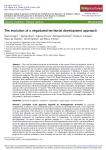Groppo P., Mora H., Ravera F., Bicchieri M., Carranza F., de Gaetano M., Tarrason D., d'Errico M. (2024). The evolution of a negotiated territorial development approach. Cahiers Agricultures, 01/01/2024, vol. 33, p. 12.
https://doi.org/10.1051/cagri/2024007
https://doi.org/10.1051/cagri/2024007
| Titre : | The evolution of a negotiated territorial development approach (2024) |
| Titre original: | L’évolution d’une approche négociée du développement territorial |
| Auteurs : | P. Groppo ; H. Mora ; F. Ravera ; M. Bicchieri ; F. Carranza ; M. de Gaetano ; D. Tarrason ; M. d'Errico |
| Type de document : | Article |
| Dans : | Cahiers Agricultures (vol. 33, Janvier 2024) |
| Article en page(s) : | p. 12 |
| Langues : | Anglais |
| Langues du résumé : | Anglais ; Français |
| Catégories : |
Catégories principales 04 - DEVELOPPEMENT LOCAL ET REGIONAL ; 4.1 - Territoire (généralités). Economie Régionale et Spatiale. Aménagement du TerritoireThésaurus IAMM TERRITOIRE ; DEVELOPPEMENT TERRITORIAL ; DEVELOPPEMENT RURAL ; CONCEPT ; PARTICIPATION ; HISTOIRE |
| Résumé : | The need for further discussion on territoriality in the context of rural development, driven by the political forces of globalization and the economic and social transformations within nations, comes as no surprise. It arises from the necessity to adapt methodologies, instruments, and activities to meet the new demands imposed by these changes and their unintended consequences. Ultimately, it fosters a fresh perspective on territorial issues, actively involving rural populations in the formulation of novel development outlooks. This article retraces a journey embarked upon over two decades ago by a group of individuals operating under the auspices of the FAO Rural Development Division. Their aim was to transition from traditional rural development approaches towards an evolving paradigm centered on dialogue, negotiation, and territorial collaboration. A multitude of factors converged to lay the foundation for the initial discussions surrounding the concept of territory. This included a consideration of ecological and gender dimensions, which placed heightened emphasis on power dynamics and prompted a reflective analysis of the conventional role of “experts." This shift redirected focus away from being mere proponents of technical solutions and toward embracing a new role as facilitators of social processes. Ultimately, the critical question at hand revolves around the very concept of “development", originally formulated and imposed by the Western world at the conclusion of the Second World War. According to the authors, it necessitates a profound revaluation. |
| Cote : | En ligne |
| URL / DOI : | https://doi.org/10.1051/cagri/2024007 |







